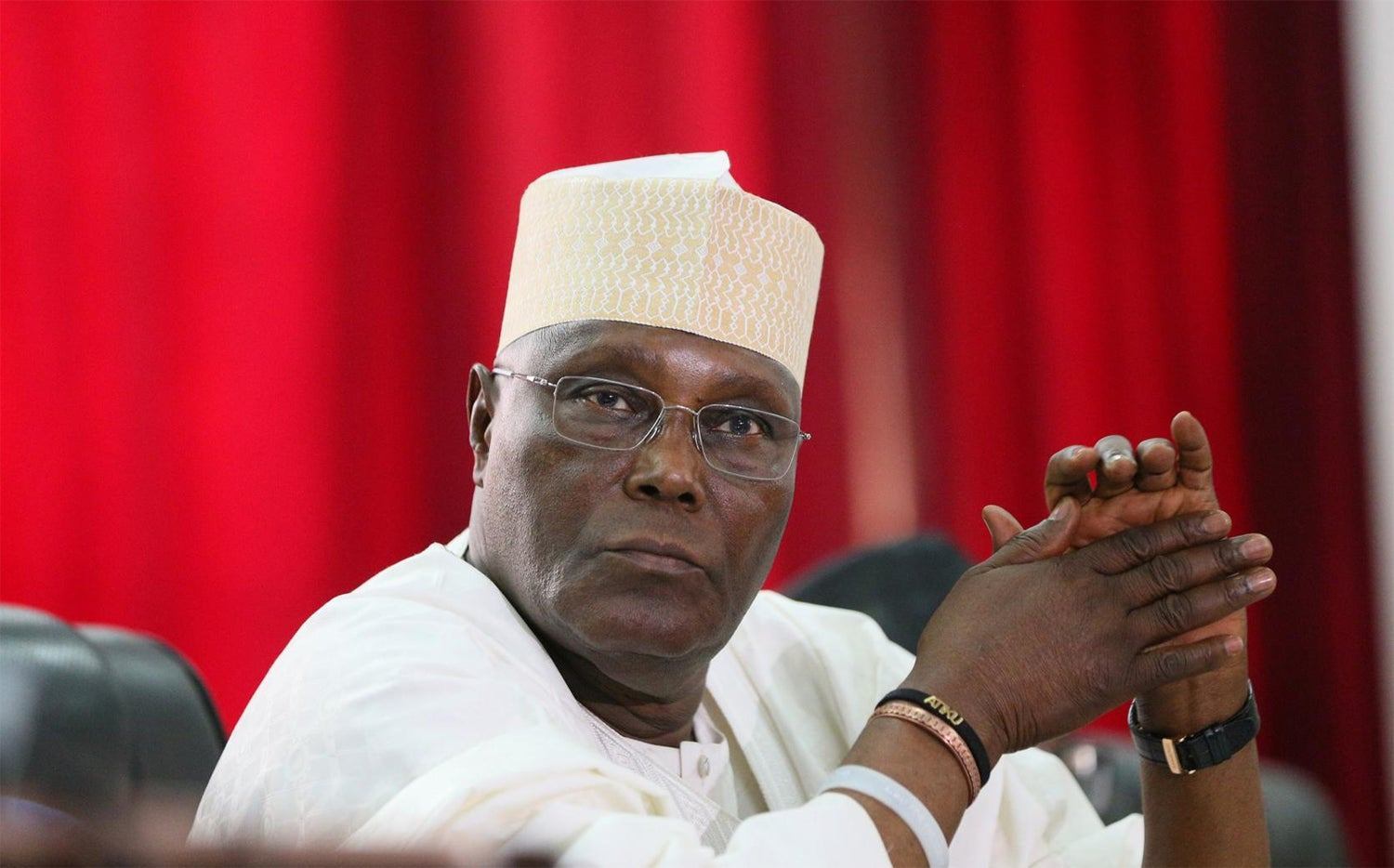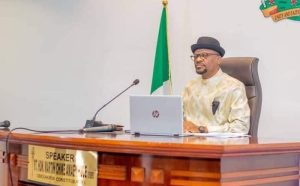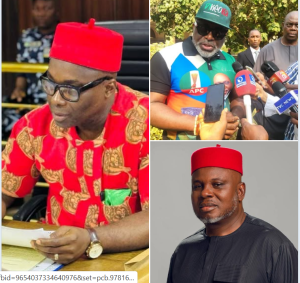Akpabio is Corrupt and Habitually Abuses Women, Atiku Makes Explosive Claims
In a stunning revelation that has sent shockwaves through Nigeria’s political landscape, former Vice President Atiku Abubakar has publicly accused Senate President Godswill Akpabio of corruption and habitual abuse of women. In a video interview broadcast by AriseTV, Atiku did not hold back his criticism, intensifying the already volatile political environment. His allegations have reignited ongoing debates about the integrity and accountability of Nigeria’s political leaders, particularly those at the helm of the National Assembly.
The accusations from Atiku are not the first to tarnish Akpabio’s reputation, with the Senate President already facing serious allegations of sexual harassment from Senator Natasha Akpoti-Uduaghan. Atiku’s comments came amidst growing concerns about the National Assembly’s complicity in facilitating corruption and abuse, and have raised questions about the future of Akpabio’s leadership.
YOU MAY READ
Atiku Abubakar, a key figure in Nigeria’s political opposition and a former presidential candidate, made his comments during a highly anticipated interview with AriseTV. Speaking with his characteristic candor, Atiku declared that he was “not surprised” by the controversy surrounding Akpabio, pointing out that the leadership of the National Assembly, under Akpabio’s stewardship, has long been compromised.
“I am not surprised because the leadership of the National Assembly is corrupt, and I have no apology about that,” Atiku asserted, reinforcing his long-held belief that corruption runs deep in Nigeria’s political institutions.
But it was Atiku’s allegations regarding Akpabio’s personal conduct that really stole the spotlight. He claimed that the Senate President had been involved in corruption even before he assumed office in the Senate, citing numerous reports he had received during Akpabio’s tenure as the governor of Akwa Ibom State. According to Atiku, Akpabio’s alleged corrupt activities spanned from financial mismanagement to the use of his political power for personal gain.
YOU MAY READ
S3x, Power, and 500 Million Naira – Senator Akpabio Accused of Harassing Natasha Akpoti-Uduaghan and Asking About Her Night
“The Senate President (Godswill Akpabio) is known to be involved in corruption, even when he was a governor. I got reports of this a lot,” Atiku stated bluntly, providing further weight to accusations that have dogged Akpabio throughout his political career.
Beyond corruption, Atiku also accused Akpabio of habitually abusing women. While the former Vice President did not provide specific instances during his interview, he referenced reports he had received about Akpabio’s alleged treatment of women, a subject that has gained significant public attention due to the ongoing allegations from Senator Natasha Akpoti-Uduaghan. These comments from Atiku appear to further strengthen the narrative that Akpabio’s political career has been marked by unethical behavior and abuse of power.
The timing of Atiku’s explosive claims could not be more significant, as they coincide with the high-profile accusations made by Senator Natasha Akpoti-Uduaghan against Akpabio. Akpoti-Uduaghan, who represents Kogi Central in the Senate, has accused Akpabio of sexual harassment, an allegation that has shaken the political establishment and sparked widespread outrage.
YOU MAY READ
Akpabio said, my waist will make good movements – Natasha
Akpoti-Uduaghan’s accusations, made public in a petition submitted to the Senate Ethics Committee, allege that the Senate President attempted to sexually harass her during a visit to his private residence in Akwa Ibom State in December 2023. The alleged incident occurred while Akpoti-Uduaghan was at Akpabio’s country home with her husband. According to the affidavit submitted by Akpoti-Uduaghan, Akpabio made unsolicited and inappropriate sexual advances during a house tour, suggesting that the two could “have a quality moment together” despite her husband being present.
Furthermore, Akpoti-Uduaghan claims that Akpabio proposed converting part of his residence into a nightclub to host a party. She describes this as an unethical and inappropriate attempt to lure her into a compromising situation. When she rejected his advances, Akpoti-Uduaghan alleges that she began facing retaliation in the Senate, including obstruction and intimidation in her legislative work.
The senator specifically pointed to her motion regarding the revitalization of the Ajaokuta Steel Company, which was repeatedly listed on the Senate order paper but was allegedly ignored without explanation. According to Akpoti-Uduaghan’s affidavit, this was a direct response to her refusal to acquiesce to Akpabio’s alleged advances.
In addition, Akpoti-Uduaghan claims that Akpabio continued to make sexual propositions even during a private meeting between the two. According to her, Akpabio told her, “Natasha, I am the Chief Presiding Officer of the Senate, and you can enjoy a whole lot from me if you take care of me and make me happy.”
These allegations have sparked a major controversy, with public outcry growing louder as more Nigerians come to terms with the depth of the accusations against the Senate President. While some dismiss Akpoti-Uduaghan’s claims as politically motivated, others view them as part of a broader pattern of abuse and harassment within Nigeria’s political system.
Atiku’s comments about Akpabio, coupled with the allegations made by Akpoti-Uduaghan, have raised concerns about a potential culture of gender discrimination and abuse within Nigeria’s political elite. The accusations, particularly the alleged sexual harassment by Akpabio, have illuminated a troubling pattern of behavior that, according to critics, has been normalized in Nigerian politics.
Gender-based violence and sexual harassment have been pervasive issues in Nigeria’s political system for many years, with women in politics often subjected to hostile work environments, threats, and exploitation. For women like Akpoti-Uduaghan, who have already faced considerable challenges in their careers as female politicians, these allegations add another layer of difficulty in navigating the political terrain. The claim that Akpabio, as Senate President, used his power to coerce a female senator into a compromising situation demonstrates the severity of the issue and the extent to which gender dynamics influence Nigerian politics.
In the wake of Akpoti-Uduaghan’s allegations, many activists and political analysts have called for a more rigorous investigation into Akpabio’s actions. There are calls for accountability, not only for Akpabio’s alleged misconduct but also for the systemic issues that allow such behavior to persist at the highest levels of government.
Atiku’s remarks have added further fuel to an already incendiary political atmosphere, particularly in light of Akpoti-Uduaghan’s allegations and the National Assembly’s handling of other sensitive issues. Many Nigerians are beginning to question the integrity of their political leadership, especially after the recent approval of President Bola Tinubu’s declaration of a state of emergency in Rivers State by the National Assembly.
YOU MAY READ
Godswill Akpabio: The First Officer of the National Assembly (NASS) to Ever Resign His Position in Defense of the Government of the Day
This approval came despite significant opposition from local leaders and civil society organizations, who argue that it was an unconstitutional and politically motivated move. The approval of the state of emergency, combined with the mounting allegations of corruption and sexual harassment against the leadership of the National Assembly, has intensified public calls for reform.
In particular, Akpabio’s leadership has come under intense scrutiny. If the allegations against him continue to gain traction, his position as Senate President may become increasingly untenable. Calls for his resignation or impeachment are growing louder, with many Nigerians demanding that he be held accountable for his actions.
As the controversy surrounding Akpabio continues to unfold, the need for accountability in Nigeria’s political system has never been more urgent. Civil society organizations, women’s rights groups, and political reform advocates are calling for a thorough investigation into Akpabio’s alleged misconduct, as well as a broader examination of the culture of corruption and abuse within Nigeria’s political institutions.
For Atiku Abubakar, the stakes are high. His public condemnation of Akpabio is not only a challenge to the Senate President’s personal integrity but also a broader challenge to the ethical standards of Nigerian politics. Atiku’s calls for reform are aimed at ensuring that Nigeria’s political leaders are held to the highest standards of integrity, transparency, and respect for the rights of women.
Ultimately, the explosive claims made by Atiku, combined with the detailed accusations from Akpoti-Uduaghan, may force the Nigerian political system to confront the deeper issues of corruption, gender inequality, and abuse that have long plagued the country’s leadership. Whether or not Akpabio faces accountability will be a key test of Nigeria’s commitment to political reform and the protection of women in politics.
The explosive allegations against Senate President Godswill Akpabio, fueled by Atiku Abubakar’s criticism and the sexual harassment claims made by Senator Natasha Akpoti-Uduaghan, have thrown Nigeria’s political landscape into turmoil. These accusations shed light on the deeper issues of corruption, abuse of power, and gender discrimination that have long plagued Nigerian politics.
As the calls for accountability and reform intensify, the coming months will likely determine whether Nigeria’s political elite will be held to account for their actions or whether these issues will continue to be swept under the rug. The future of Nigeria’s democracy, and the role of women in politics, hang in the balance as the nation grapples with the fallout from this explosive scandal.
Source: The Trent






